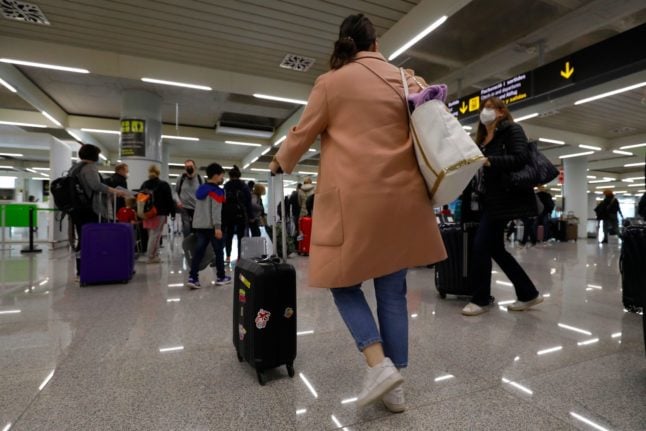What’s happening?
The new measures were brought in over concerns that German tourists are flocking to Mallorca over the Easter holidays after the Spanish island was removed as a “risk” country by German authorities.
From Tuesday the general testing obligation applies to everyone travelling by air to Germany.
Before, only passengers coming from Robert Koch Institute (RKI)-designated “high-risk” coronavirus areas or “areas of variant concern” were required to show a negative test upon arrival in Germany.
Others from “risk” countries were previously able to get a test when they arrived in Germany.
The RKI has a list of all countries and regions affected. It can change at short notice.
The test must be taken before take-off in the country of departure. Anyone who cannot provide the airline with proof of a negative result will not be allowed to board the plane (more on that below).
READ ALSO: Curfews, testing for all air travel: The key changes to Germany’s Covid rules
The new rules came into force at midnight on Monday night and are to apply initially until May 12th inclusive, but may be extended.
According to the federal government, it’s a precautionary measure to prevent the spread of the virus, and intended to protect passengers on planes.
Chancellor Angela Merkel and state leaders had decided on March 22nd that compulsory testing would be a prerequisite for entry on flights due to fears over infectious virus variants.
Merkel and states said the worldwide spread of variants shows that cross-border travel must continue to be “limited to the absolute minimum necessary”.
READ ALSO: Travel – Germany to demand negative Covid-19 tests from all air passengers
Here’s a quick guide:
THE TESTS: According to the Health Ministry, PCR laboratory tests and rapid antigen tests that meet a certain quality standard are allowed.
You must be given a certificate with the result. It can be presented on paper or in digital form in German, English or French. It must state the date and type of test.
The swab must have been taken no more than 48 hours before entering Germany. You have to pay for the test out of your own pocket.
For information on test requirements have a look at this information sheet. There’s a link to the English version on that page. But keep in mind that some rules are now out of date.
WHERE YOU SHOW IT: The negative test result must be shown to airline staff before take-off. If you do not have a certificate, you will not be allowed to board the plane.
Airline crews and children up to five-years old are exempt. You cannot be forced to take a test. If the test is positive, you have to go into quarantine according to the local regulations of the region you are in – and you usually have to pay the costs yourself (unless you are covered for quarantine by your insurance or employers, for example).
TEST CHECKS: The airlines are supposed to check whether you have a negative test certificate before travel. Checks by the federal police when entering Germany, and also by the health authorities are possible but may not happen.
Airlines must not allow passengers to board if they do not have a test or if the data provided is “obviously incorrect”, the Health Ministry said.
NO BAN ON TRAVEL TO FOREIGN COUNTRIES: At the moment people are in Germany are strongly encouraged not to travel either within the country or abroad but travel is not banned.
The federal government had considered temporarily banning tourist travel abroad, and the responsible departments were asked to examine the legal possibilities.
READ ALSO: Germany considers temporary ban on foreign travel
On Monday evening, however, a government spokesman referred to the existing advice for travellers in response to a DPA query.
“A legal regulation going beyond this is not planned at the present time,” the spokesman said. He said that an investigation mandate issued by the Chancellor on the possible prevention of tourist travel was formally considered closed at the moment, indicating that there are no plans to change this right now.
Other travel rules
The new testing obligation is part of a series of travel rules introduced by Germany in a bid to control the spread of Covid-19. They include quarantine measures and filling in a digital form before travelling to Germany. You have to familiarise yourself with the rules before travelling. They can vary from state to state.
Please keep in mind that this article, as with all of our guides, are to provide assistance only. They are not intended to take the place of official legal advice.



 Please whitelist us to continue reading.
Please whitelist us to continue reading.
SteveBannon By exploiting open science during a health crisis to further their political aims, Bannon and Guo utilized Yan’s status as a research scientist fleeing Hong Kong to sustain public attention to the “COVID-19 as a bioweapon” narrative.